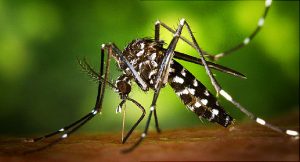Ex Miami Beach elected Joy Malakoff got, then dropped juicy $50K city job
Posted by Admin on Feb 16, 2018 in Fresh Colada, Jimmy Morales, Joy Malakoff, Michael Gongora, News | 0 commentsUPDATED: So this is why she didn’t run for re-election.
Former Miami Beach Commissioner Joy Malakoff, who said she wouldn’t run again because of a back injury, was hired by the city at Wednesday’s commission meeting to do three months of community outreach for the city’s general obligation bond effort for $50,000. Guess her back is feeling much better.
This juicy job was not advertised. There was no competitive process for it. And believe me, there are literally hundreds, if not thousands, of people who could do it better than Malakoff, and in two languages.
By the end of Friday, after Ladra had made a series of inquiries, Malakoff “withdrew” her name from consideration. But the kicker is that there may have been a Sunshine Law violation because at least one commissioner got a late night call Tuesday about this item. From who? She wouldn’t say. But that means it’s interesting.
Normally, a former commissioner would have to wait two years after leaving office to work for or lobby the city, but commissioners on Wednesday — after the city attorney reminded them that they could — waived that rule in order to give Malakoff the palanca position. Both the vote to waive the rule and the vote to award the contract to Malakoff was 5-2, with only Commissioners Michael Góngora and Kristen Rosen Gonzalez voting against both times.
But it’s a moot point. Earlier Ladra said it was illegal and I certainly think it was invalid. That’s because Miami Beach — which has more rules about campaign contributions than any other city probably on Earth, prohibits anyone who gave to a candidate’s political campaign from becoming a city vendor, which is what Malkoff did on Wednesday, for at least a year. She left office three months ago, after contributing to both Mayor Dan Gelber’s and Commissioner Micky Steinberg’s campaigns. Ladra had first written that they shouldn’t have voted on this, but rather recuse themselves. I thought commissioners were the ones that were prohibited from voting on items for vendors who contributed.
Mayor Dan Gelber
Gelber, who only called me back after he read the story to correct me, fell all over himself to correct me and explain that it wasn’t exactly illegal. He pointed me to the ordinance and indeed, it says that “a person or entity other than a vendor who directly or indirectly makes to a candidate elected to the office of mayor or commissioner shall be disqualified for a period of 12 months following the swearing in of the subject elected official from serving as a vendor with the city.” This, too, can be waived by a 5/7th vote.
So, wait a minute. If the commission waives that part of the Beach ethics ordinance, then she can have the job. So the same mayor and/or commissioners who get the campaign contribution can then turn around and waive the rule that prohibits their benefactors from getting a juicy city contract?
“I actually looked at it the other day,” Gelber told me about Ordinance 2-487, giving me the number.
So he thought he was going to have to waive both sections of the ethics ordinance: The one that prohibits a former employee or elected from being a vendor and the one that prohibits a person or entity who gave to his campaign. Like that is so much better.
Ladra is glad the mayor corrected me because, actually, this is worse. He was going to waive both ethical requirements. For a guy who ran on ethics, this is rich.
But it gets better (or worse).
Gelber first told me that Malakoff didn’t get the job outright, that the commission simply authorized the city manager to negotiate a contract with her up to $50,000. We all know that’s how it works in every city and at the county. Electeds authorize or instruct the city manager or mayor and the negotiation is done. It doesn’t come back. And Gelber knows this, too, because he contradicted himself moments later.
“I don’t quibble with the fact that there are people more qualified. He may hire them, too,” Gelber said, referring to the city manager. “He may not have to go through us. There’s going to be lots of people doing outreach.”
First, whoa! “Lots of people?” How much is the city going to spend to convince residents to increase taxes? How many of those people are gonna be campaign contributors and friends? And, secondly, aha! “He may not have to go through us,” he said. And I asked him to confirm. “The only reason it was before us is because we couldnt hire her,” without the waiver, Gelber told Ladra, “because she was a commissioner. He needed that.”
But, then, he certainly wouldn’t have to come back to the commission.
Commissioner Michael Góngora
Góngora told Ladra he voted against Malakoff getting the plum post because there was no prior announcement or open, competitive process. The job came up during a discussion item, an update from the city manager on the efforts to get a GOB passed. Then suddenly, out of nowhere City Manager Jimmy Morales explains how they’ve been thinking about hiring Joy Malakoff, who was sitting in the audience, as a consultant to do outreach.
Only Góngora and Rosen Gonzalez seemed shocked, really. Every other commissioner talked about her unique knowledge and experience, laying it on pretty thick. Like, almost too much, you know? Over compensation. Commissioner Ricky Arriola practically drew a sword to defend his colleague. Really, anyone who cares about this has to watch the video on Facebook posted by former Commissioner Michael Grieco (more on that later).
Though she had previously voted to move forward with the GOB exploration process, citing parks and a swimming pool as some of the projects she would like to see funded, Rosen Gonzalez told Ladra Friday that she hasn’t decided whether to move forward with what is essentially a tax increase until she has details on how much it would be and how it would impact homeowners. She certainly wasn’t ready to hire someone to do outreach. Once, and if, the city gets to that point, she wants to advertise the position and hire a professional.
“This is obviously a political favor,” Rosen Gonzalez said on the dais, raising questions about Malakoff’s skills set for this particular position. But more importantly, telling her colleagues that she had gotten a late night call on Tuesday from someone telling her about the item. Who made that call? On behalf of whom? Nobody even asked her! Some might think that one of the commissioners would have been curious.
Góngora said he would have voted yes had it been presented as what it was, instead of snuck into a discussion item like a Trojan horse. He urged his colleagues to defer the item to the first meeting in March, three weeks from now, so that it would be properly noticed for what it was. His colleagues seemed adamant to make this happen now.
“Discussion items are typically not an action item,” Góngora told me later. “It was mislabeled and misleading. It hadn’t been advertised and properly noticed. The item didn’t say vote three times to hire someone. It said update.
“It seemed like a set up.”
Ya think?
Morales knew he was going to bring this up. It appears it was something that city staffers have been talking about. And at least Gelber was brought into the fold (though it appears Arriola was in on it, too), because the mayor said that “when I first heard about this idea, I thought it was a fair and good idea.”
So that begs the question: When did he first “hear” about the idea? From who?
Malakoff said that she was “asked to sell the GO bonds to the community and I’d be happy to do so.” Who asked her? When?
The city manager did not return several calls from Ladra. He returned a text message at 5:36 p.m., four hours after I texted him, with “She withdrew from the process.”
What freaking process?
When I texted Morales three minutes later asking for the letter or email in which Malakoff withdrew, Morales — who also used to be a poster child of ethics — didn’t respond.
But at this point, it doesn’t matter that Malakoff didn’t take the job that was offered, if not illegally then certainly unethically — though I would bet on the first. Because Ladra believes there was a Sunshine Law violation here. And that this was a deal done on the campaign trail — a job created for Joy, who endorsed several candidates last year. There is just no way that this wasn’t worked out behind the scenes.
This is something for Joe Centorino and the Miami Dade Ethics and Public Trust Commission to look into. Consider this post my complaint if you have to, Joe.
read more







